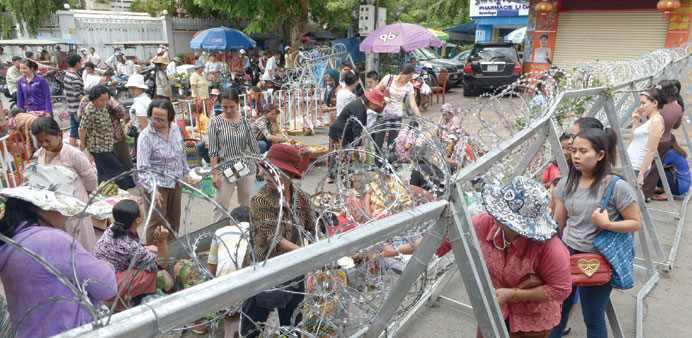Cambodian women buy food and vegetables through barbed wire at a market during the National Assembly meeting in Phnom Penh yesterday.
AFP/Phnom Penh
Cambodia’s parliament reappointed strongman premier Hun Sen for another five-year term yesterday, extending his nearly three-decade rule as the opposition threatened to mount fresh protests over fiercely disputed elections.
The controversial move came despite recent mass public demonstrations and a boycott of parliament by Hun Sen’s political rivals, who have alleged widespread fraud in the July polls.
The opposition Cambodia National Rescue Party (CNRP) refused to take its seats for the opening session of the lower house on Monday, saying the kingdom was sliding towards “dictatorship”. All 68 ruling party lawmakers yesterday agreed a list of government members and reappointed Hun Sen as premier through a show of hands, according to a reporter in parliament.
Opposition leader Sam Rainsy slammed the developments as a “constitutional coup” and said the ruling Cambodian People’s Party (CPP) “illegally clings on to power”, in a post on his Facebook page.
The CNRP, which alleges widespread vote irregularities, has described the legislature as a “one-party parliament” and warned of fresh demonstrations in the capital.
“There will be mass protests in Phnom Penh and nationwide,” party spokesman Yim Sovann told AFP after Hun Sen’s re-election.
“The CNRP will continue to seek truth and justice for the voters.”
The CPP has rejected the opposition’s call for an independent investigation into the election.
Speaking after his reappointment, Hun Sen blamed the CNRP for the absence of an opposition in the National Assembly.
“We cannot become hostages to any group,” he told reporters.
He said his government had not “closed the door” to the opposition and had offered their lawmakers the posts of deputy parliamentary president and chairmanship of several committees.
If the opposition wants to negotiate further its MPs must first be sworn in, Hun Sen said.
According to official results, the CPP won 68 seats against 55 for the CNRP in the July polls.
The number is enough for the government to pass legislation in the lower house.
But experts have said the government risks being seen as lacking political legitimacy if it introduces laws without an opposition in parliament.
“Hun Sen will have to be wary of potential unrest as many Cambodian people are viewing the CPP—and Hun Sen himself—as ruling without legitimacy,” said Ou Virak, president of the Cambodian Center for Human Rights.
“Throughout these elections, we have seen the Cambodian people making their voices heard and demanding real change.”
Tens of thousands of opposition supporters joined three days of demonstrations in the capital earlier this month. One protester was shot dead and several wounded as security forces clashed with a stone-throwing crowd.
Activists also accused dozens of police and thugs in civilian clothing of launching a violent crackdown on a peaceful vigil at a pagoda in the capital late on Sunday, using electric batons and slingshots.
Nine demonstrators as well as several foreign and local journalists were injured, witnesses said.
A statement by local and international watchdogs, including Amnesty International and Human Rights Watch, condemned “unnecessary and excessive use of force” by the authorities.
“The recent incidents raise serious questions about the will or capacity of government authorities and the security forces to respect and protect the fundamental rights of those seeking to peacefully express their opinions,” they said.
Hun Sen, who suffered his worst poll result in 15 years in July, last week agreed to find a peaceful solution to the dispute in talks with his main rival Rainsy.
The 61-year-old former Khmer Rouge cadre—who defected and oversaw Cambodia’s rise from the ashes of war—has ruled for 28 years and vowed to continue until he is 74.
Opposition leader Rainsy returned from self-imposed exile in July after a royal pardon for criminal convictions he contends were political motivated, but he was barred from standing in the polls later that month.
Garment exports and tourism have brought buoyant economic growth but Cambodia remains one of the world’s poorer countries and the government is regularly accused of ignoring human rights and suppressing political dissent.

